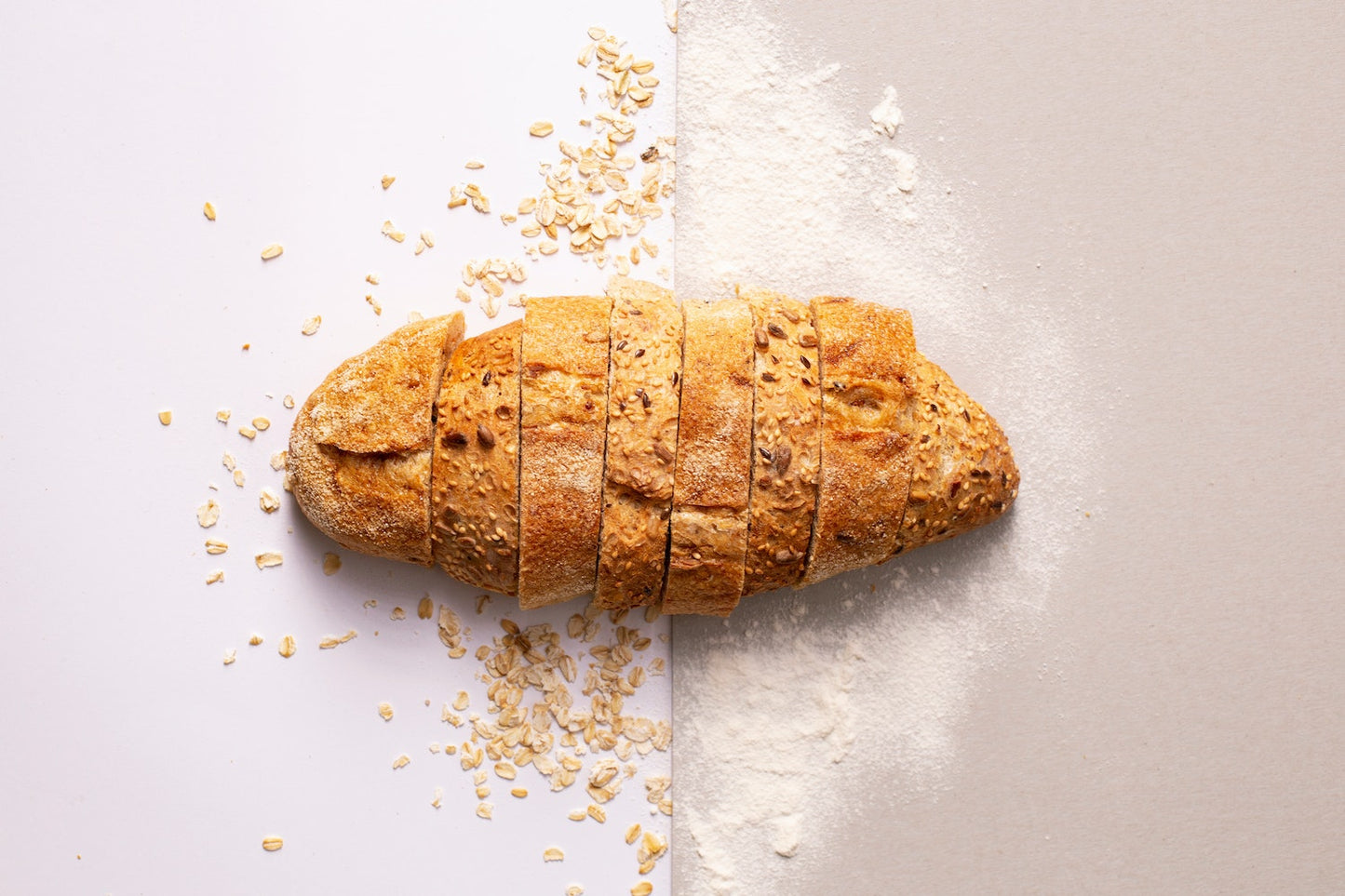
Can Stress Cause Bloating? Everything You Need To Know
As you know, stress is an unavoidable part of our daily lives, and boy, can it do a number on our overall well-being!
But did you know that stress doesn't stop at messing with our minds? Nope, it goes straight for our digestive system, causing all sorts of uncomfortable symptoms, including the much-dreaded and undesired sensation of bloating.
So hold on tight as we explore the fascinating connection between stress, the digestive system, and bloating. With a little knowledge and some effective strategies, you'll be able to find relief and regain control over your digestive well-being.
What Is Bloating and Why Does It Happen?
Bloating is that uncomfortable feeling of fullness, tightness, or distension in your belly. It can really throw a wrench in your day, making you feel less than your best. But fear not! By understanding the causes of bloating, we can unlock the secrets to managing it effectively.
Carbohydrates
Let's start with carbohydrates. Some of them have gained quite a reputation for causing bloating. You know, foods like beans, lentils, cabbage, and onions.
These tasty delights contain complex sugars that aren't fully broken down in the small intestine. Instead, they venture into the large intestine.
And voila! Gas production and bloating become the life of the party. This process, known as fermentation, tends to hit the sensitive ones the hardest.
Gut Bacteria
Gut bacteria form a bustling community known as the gut microbiome. But just like any community, there can be imbalances.
When certain species of bacteria grow out of proportion, excessive gas production and bloating can join the party. What causes this microbial madness, you ask? Well, factors like stress, a poor diet, and some medications can quickly throw things out of whack.
Excess Gas
Excess gas is the unexpected guest that overstays its welcome in your stomach. In doing so, it can often contribute to bloating.
Ever swallowed air while devouring your favorite meal or sipped on carbonated beverages? Well, these actions can introduce extra gas into your digestive tract.
And let's not forget the breakdown of certain foods like beans, lentils, broccoli, and carbonated drinks, which can cause extra gas. When this gas decides to stick around instead of making a graceful exit, bloating soon comes and crashes the party.
Constipation
Constipation is no friend to our digestive system. When stool decides to take its sweet time journeying through the intestines, it can cause a backup — a literal traffic jam of sorts. And, you guessed it — this backup leads to abdominal distension and discomfort.
One common side effect of stress is that it can mess with the normal rhythm of our digestive system, affecting bowel movements and potentially causing constipation.
Hormones
Ladies, you know hormones can sometimes have a mind of their own. During the menstrual cycle, hormonal fluctuations can lead to water retention and, you guessed it, bloating. Ah, the joys of womanhood!
SIBO
Now, let's talk about SIBO — small intestinal bacterial overgrowth. Picture an excessive growth of bacteria in the small intestine — definitely not the best neighborhood watch.
This overgrowth throws a bloating bash, complete with gas, abdominal pain, and other digestive symptoms. Stress and changes in gut motility are believed to contribute to the development of this bacterial bonanza.
Medical Conditions
Lastly, there are certain medical conditions that can cause bloating. Conditions like irritable bowel syndrome (IBS), inflammatory bowel disease (IBD), celiac disease, and food intolerances can make bloating a chronic companion.
Remember, if bloating persists or becomes severe, it's important to consult a healthcare professional for a proper diagnosis and tailored treatment.
What’s the Connection Between Stress and Bloating?
Stress is a sneaky troublemaker that loves to mess with our bodies. Turns out, it has quite the connection to bloating.
Allow us to unveil the fascinating relationship between stress and our digestive system, known as the brain-gut axis. Understanding this connection is like finding the secret treasure map to managing and alleviating bloating effectively.
When stress knocks on our door, our brain answers the call by unleashing a squad of stress hormones, including the notorious cortisol. These hormones have a way of influencing every nook and cranny of our bodies, including our precious digestive system. Cortisol, also known as the "stress hormone," can stir up some digestive trouble in a few clever ways.
One of cortisol’s favorite tricks is to meddle with gut motility. Gut motility, fancy lingo for the movement of food through the digestive tract, can go haywire when stress hormones go into overdrive.
It's like a traffic jam in there — food slows down or speeds up, leading to irregular digestion. And guess what? This can often result in bloating. Food hangs out in the digestive tract longer than usual, causing discomfort and a whole lot of gas buildup.
But that's not all! Stress is a master at cranking up the volume of pain sensitivity in the gut. It flips the switch on the brain-gut axis, amplifying pain signals and making us hyper-aware of every sensation in our digestive system. Suddenly, that bloating becomes impossible to ignore.
Oh, and there's more mischief to come. Stress loves to disrupt the delicate harmony of our gut bacteria. It messes with the balance, causing an overgrowth of the not-so-friendly bacteria and a decline in the good guys.
This imbalance, aptly named dysbiosis, is another prime suspect behind bloating. The villainous bacteria can cause excessive gas production and ferment those undigested carbohydrates, heightening the bloating drama.
What Foods and Supplements Can Support Gut Health?
If you're on a mission to support your gut health and bid farewell to bloating, listen up! There are some fantastic options you can add to your diet that can work wonders for your digestive system. Let's dive into these gut-loving goodies.
Probiotics
Probiotics are your gut's best buddies. These helpful bacteria can restore balance to your gut microbiome and keep digestion in tip-top shape. You can easily find them in yogurt, sauerkraut, kefir, and kimchi, or grab them in supplement form.
Probiotics work their magic by populating your gut with good bacteria, which can encourage gut motility, soothe tension, and support overall digestive wellness. Make probiotics part of your daily routine, and you'll likely wave goodbye to bloating, enjoy regular bowel movements, and revel in a thriving gut ecosystem.
Prebiotics
Next up, we have prebiotics — the food for your gut’s best friends. These non-digestible fibers nourish and support the growth of probiotics and beneficial bacteria in your gut, ensuring a healthy microbiome.
Load up on onions, garlic, leeks, bananas, asparagus, and chicory root for a prebiotic boost. By adding prebiotic-rich foods to your plate, you can provide the fuel necessary for those good gut bacteria to flourish, supporting digestion and soothing bloating.
Bone Broth
Ever heard of bone broth? Well, it’s all the rage for nurturing your gut. This liquid gold is made by simmering bones, connective tissues, and aromatics for ages, creating a nutrient-dense concoction.
Loaded with collagen, amino acids, and minerals, bone broth can soothe your digestive system. The collagen in bone broth can support your intestinal lining, soothing irritation and supporting gut health. Sip on some bone broth regularly, and you'll give your gut some help while supporting overall digestive wellness.
If you don’t have the time to make your own bone broth (or if you just want to spend your time elsewhere), look for our Homestyle Bone Broth Powder. This bone broth powder contains all of the benefits of fresh, organic bone broth in a much more convenient package.
Magnesium
Magnesium is our next ally. This mineral wears many hats, including promoting muscle relaxation and soothing feelings of stress. But it doesn't stop there — it's a friend to your digestive health, too.
Magnesium supplements can help relax the muscles of your digestive tract, soothing stress-related symptoms and keeping your bowel movements on track. Remember, it's wise to consult with a healthcare provider before starting any new supplements to ensure they're right for you.
Digestive Enzymes
Digestive enzymes are nature's helpers in breaking down food and keeping digestion smooth sailing. Some folks may have deficiencies in certain enzymes, leading to trouble digesting certain foods.
Digestive enzyme supplements lend a hand by aiding the breakdown of carbs, proteins, and fats, making digestion efficient and soothing bloating and discomfort. They're especially handy for individuals with lactose intolerance.
Medicinal Herbs
Let's not forget about the power of medicinal herbs. Ginger, peppermint, fennel, and chamomile have long been used to support digestion and ease bloating. These herbs work their magic by relaxing the muscles of your digestive tract, calming irritation, and providing comfort.
Ginger, in particular, boasts significant tension-soothing properties, making it a digestive health superstar. Sip on herbal teas and infusions, or add these herbs as flavorful seasonings to your meals for natural digestive support and relief from bloating.
What Lifestyle Changes Can Help Soothe Stress and Manage Bloating?
Besides adjusting your diet and taking supplements, incorporating certain lifestyle changes can work wonders for soothing stress and managing bloating. Let's explore effective strategies for a healthy digestive system and overall well-being.
Regular Exercise
Exercise isn't just good for your general health — it also plays a vital role in managing stress and supporting gut health. Physical activity can reduce stress, boost blood flow to the digestive system, and promote healthy bowel movements.
Aim for 30 minutes of moderate-intensity exercise like brisk walking, jogging, or cycling most days of the week. Discover activities you enjoy and make them part of your routine to foster a healthier body and mind.
Balanced Nutrition
Maintaining a balanced diet is crucial for gut health and preventing bloating.
Focus on nutrient-rich foods like whole grains, lean proteins, fruits, vegetables, and healthy fats. These provide essential vitamins, minerals, and fiber that support digestion and overall well-being.
Identify your personal food triggers and limit or avoid foods that commonly cause bloating. Keeping a food diary can help you make informed dietary choices.
Stay Hydrated
Proper hydration is key to digestion and preventing bloating. Drinking enough water throughout the day maintains optimal digestive function and promotes regular bowel movements.
Aim for at least eight glasses of water daily, adjusting as needed based on your activity level. Infuse water with fruits or herbs for a refreshing twist if plain water isn't your cup of tea.
Avoid Processed Foods
Processed foods like fast food, packaged snacks, and sugary beverages contribute to digestive issues and bloating. They're often high in unhealthy fats, sodium, and artificial additives that disrupt gut bacteria balance and encourage irritation.
Opt for whole, unprocessed foods whenever possible. Fresh fruits, vegetables, lean proteins, and whole grains provide the nutrients your body needs while supporting healthy digestion.
Get Enough Sleep
Adequate sleep is essential for overall well-being, including digestive health. Lack of sleep increases stress levels and disrupts hormonal balance, potentially affecting digestion and causing bloating.
Aim for seven to nine hours of quality sleep each night to allow your body to rest and recover. Establish a relaxing bedtime routine, create a comfortable sleep environment, and prioritize sleep as a vital part of your self-care routine.
Mindfulness Practices
Deep breathing exercises and yoga are powerful tools for reducing feelings of stress and supporting healthy digestion.
Shallow breathing during stress can contribute to digestive discomfort. Take slow, deep breaths to activate the relaxation response and alleviate stress-induced bloating. Incorporate diaphragmatic breathing into your routine for a calm mind and healthy gut.
Yoga combines movement, breath control, and mindfulness, which can help support digestion, encourage gut motility, and relieve bloating. Include yoga poses like Child's Pose, Cat-Cow, and Supine Twist for digestive benefits.
Intermittent Fasting
Intermittent fasting, or alternating periods of fasting and eating, can help manage bloating and support digestion. Giving your digestive system regular breaks can allow it to rest and reset, promoting digestion and gut health. Find an intermittent fasting approach that suits you, and consult a healthcare professional if needed.
The Takeaway
Take charge of your digestive well-being and ease bloat with these effective strategies. By understanding how stress affects your body, addressing the underlying causes of bloating, and making mindful choices in your diet and lifestyle, you can find relief and restore balance to your gut.
And for a natural and nourishing option, consider incorporating Dr. Kellyann's bone broth into your routine. Packed with essential nutrients, amino acids, and collagen, this bone broth can help soothe the digestive system, support gut health, and alleviate bloating.
Sources:
The Microbiome | The Nutrition Source | Harvard T.H. Chan School of Public Health
Gas in the Digestive Tract | Johns Hopkins Medicine
SIBO (Small Intestinal Bacterial Overgrowth): Symptoms, Diet, Causes & What it Is | Cleveland Clinic
Irritable Bowel Syndrome and Gluten-Related Disorders | PMC
Cortisol: What It Is, Function, Symptoms & Levels | Cleveland Clinic
Gut Microbiome Health and Dysbiosis: A Clinical Primer | PMC
Prebiotics: Definition, Types, Sources, Mechanisms, and Clinical Applications | NCBI Bookshelf
The Importance of Magnesium | MINDD
Digestive Enzymes and Digestive Enzyme Supplements | Johns Hopkins Medicine
Eating, Diet, & Nutrition for Gas in the Digestive Tract | NIDDK







